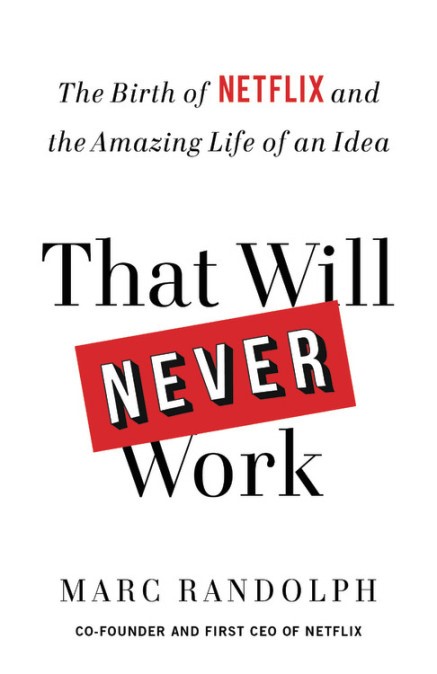What does the guy behind Netflix think is the secret of innovation? “The most important thing I’ve learned in my career as an entrepreneur is that nobody knows anything,” said Marc Randolph, who cofounded the upstart DVD-sales-turned-DVD-rental-website in 1997 and served as the company’s first CEO. “It’s almost impossible to know a good idea from a bad one. So, when someone says, ‘That will never work,’ they really have no idea. The only way to figure out whether something will work is by trying.”

“I chose this title because I wanted people to see that even an idea that everyone, including my wife, said would never work could work,” Randolph told HSMAI. “I want people to know that you don’t need to be a one-in-a-thousand entrepreneur to be successful. That it’s truly inside all of us.”
Do you remember the first movie you ordered from Netflix?
The first move I rented was Casino, and not only was it my first movie, it was the first movie. I still have the original invoice we printed out.
You write in That Will Never Work that Netflix was born at a time when many different startup companies were trying to become “the Amazon.com of [fill in the blank].” With that in mind, what made Netflix not something new but something innovative?
The funny part about this is that we were kind of the “Amazon of DVDs” in the early days. For the first couple of years of Netflix, we sold more DVDs than we rented out. It wasn’t until Jeff Bezos invited Reed Hastings and I up to Seattle to explore purchasing Netflix to jump-start their entry into video that we realized that we needed to differentiate ourselves from Amazon if we wanted to survive. That was when we decided to, in one day, walk away from selling DVDs and focus everything on renting them.
And remember how everyone said, “That will never work”? Well, they were right! At first, it didn’t work. It took hundreds of failed experiments and — yes — true innovation to come up with a model that made it possible to have a successful business that rented DVDs by mail. The innovative subscription model was really created by the necessity of getting out of DVD sales before Amazon got into it.
When did you first realize that Netflix was going to not just succeed but truly disrupt the established industry of home video rental?
When you start a company — at least, when I start a company, and Netflix was number six — you’re never looking that far in the future. You’ve got an idea and you’ve got a rough idea of where you might want to take it, but you can’t get too far ahead of yourself, since the future involves too many forking roads, none of which you know in advance you’ll be taking.
I don’t think it was until our IPO [in May 2002] that I felt like we had finally disrupted the industry. Blockbuster had turned down buying Netflix the year prior, which really lit a fire under us to succeed. Not because we wanted to beat Blockbuster, but because the only company that we thought would want to acquire us was saying no, and if we didn’t begin to truly succeed and disrupt the industry, all of our employees would be out of a job. Like changing to the subscription model years before, it again came down to necessity.
What are some of the major challenges did you not anticipate when you first launched Netflix?
When Reed Hastings and I first tested the idea of mailing DVDs to people, we simply mailed a CD in an envelope to Reed’s house and it got there in one piece. But it turned out that this was a fluke. When we went to actually begin mailing DVDs for real, they were breaking, they were jamming the machines, they were costing twice as much as we expected to mail. It ended up being a huge complication figuring out how to design an envelope that could protect the DVD, serve as a return mailer, not get stolen, not get mangled, and do all of that for the price of a single postage stamp.
You write about sometimes feeling like the victim of your own success — as Netflix grew, as the number of employees increased, and as it evolved from a scrappy startup. Why was it important to you to hold onto that startup spirit?
As we grew, it was easy to lose sight of the freedom and responsibility that was a natural part of the early days. As we got bigger, we naturally began putting in guardrails to try and prevent mistakes. We built in checks and balances. But in 2001, we were forced to lay off nearly 40 percent of the company, and the resulting leanness brought back all of the feelings of being a lean startup again — with freedom and responsibility not being a slogan but pretty much the only option. Seeing how well that worked, and how good it felt, made us commit to do what we could to preserve that culture from that point forward, and I think that is one of the most powerful tools Netflix has at its disposal.
My advice for other companies is to always remember what made you unique during your startup days. Hold on that to that uniqueness, and instill it in new employees, as you grow.
You anticipated Netflix eventually becoming a streaming platform, but did you also see it developing its own original content?
I certainly didn’t, though it doesn’t surprise me at all. From the very beginning, Netflix has always been about connecting people with entertainment they loved. At first, that was just having a content-rich site. Then it was developing a taste-prediction algorithm. Then it’s creating your own content. And then, before you know it, you’ve gotten more Academy Award nominations than any other studio.
When you look at each developmental stage of Netflix, you’ll find that they were always creating a need and then filling it. It started with selling DVDs online before DVDs were even commonplace, then renting DVDs through an online subscription service, which then evolved into streaming content using that same subscription method. Creating original content was just the next natural evolutionary phase for Netflix.
In some ways Airbnb has become the Amazon of the hotel industry, disrupting the traditional model of how people find and book guest rooms when they travel. What might the industry learn from how Blockbuster responded — or didn’t respond — to Netflix?
When Netflix came along, Blockbuster didn’t respond because they didn’t want to do anything that might disrupt their established business. They didn’t want to put their best programmers on it. They didn’t want to allocate resources to it. They didn’t want to do things that might upset their franchises. They were so focused on doing everything they could to protect their old business that they didn’t spend any time doing what they had to do to ensure they were successful in what they knew — even then — was the future business.
That’s what sinks established companies. They see what’s coming, but they don’t have the courage, the ability, or the confidence to walk away from their established lines of business to do everything possible to make the future one successful. The real lesson here is that if you are not prepared to disrupt yourself, you’re leaving things wide open to have someone else disrupt your business for you.
